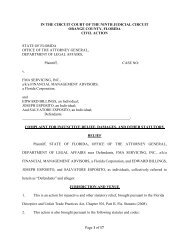Roman Pino v. Bank of New York Mellon - Fourth District Court of ...
Roman Pino v. Bank of New York Mellon - Fourth District Court of ...
Roman Pino v. Bank of New York Mellon - Fourth District Court of ...
Create successful ePaper yourself
Turn your PDF publications into a flip-book with our unique Google optimized e-Paper software.
assignment <strong>of</strong> mortgage was a critical omission. BNY <strong>Mellon</strong> responded byamending the complaint only to attach a new unrecorded assignment, whichhappened to be dated just before the original pleading was filed.In response to this amendment, defendant moved for sanctions. He allegedthat the newly produced document <strong>of</strong> assignment was false and had beenfraudulently made, pointing to the fact that the person executing theassignment was employed by the attorney representing the mortgagee, and thecommission date on notary stamp showed that the document could not havebeen notarized on the date in the document. The defendant argued that theplaintiff was attempting fraud on the court and that the court should considerappropriate sanctions, such as dismissal <strong>of</strong> the action with prejudice.Concurrent with the filing <strong>of</strong> this motion, the defendant scheduled depositions<strong>of</strong> the person who signed the assignment, the notary, and the witnesses namedon the document — all employees <strong>of</strong> Florida counsel for BNY <strong>Mellon</strong> — for thefollowing day. Before the scheduled depositions, BNY <strong>Mellon</strong> filed a notice <strong>of</strong>voluntary dismissal <strong>of</strong> the action.Five months later, BNY <strong>Mellon</strong> refiled an identical action to foreclose thesame mortgage. The new complaint no longer claimed the note was lost andattached a new assignment <strong>of</strong> mortgage dated after the voluntary dismissal. Inthe original, dismissed action, the defendant filed a motion under rule 1.540(b),seeking to strike the voluntary dismissal in the original action on the grounds<strong>of</strong> fraud on the court and for a dismissal <strong>of</strong> the newly filed action as aconsequent sanction, requesting an evidentiary hearing. The trial court deniedthe motion without an evidentiary hearing, essentially holding that, becausethe previous action had been voluntarily dismissed under rule 1.420, the courtlacked jurisdiction and had no authority to consider any relief under rule1.540(b).We affirm the trial court’s refusal to strike the notice <strong>of</strong> voluntary dismissal.Neither rule 1.540(b) nor the common law exceptions to that rule allow adefendant to set aside the plaintiff’s notice <strong>of</strong> voluntary dismissal where theplaintiff has not obtained any affirmative relief before dismissal.Rule 1.420(a) permits a plaintiff to dismiss an action without order <strong>of</strong> thecourt “at any time” before a motion for summary judgment is heard or beforeretirement <strong>of</strong> the jury or submission to the court if the matter is tried non-jury.“Our courts have consistently construed this rule as meaning that, at any timebefore a hearing on a motion for summary judgment, a party seekingaffirmative relief has nearly an absolute right to dismiss his entire action once,without a court order, by serving a notice <strong>of</strong> dismissal.” Ormond Beach Assocs.Ltd. v. Citation Mortg., Ltd., 835 So. 2d 292, 295 (Fla. 5th DCA 2002); see alsoMeyer v. Contemporary Broadcasting Co., 207 So. 2d 325, 327 (Fla. 4th DCA1968). The courts have carved out narrow exceptions to this entitlement:2



